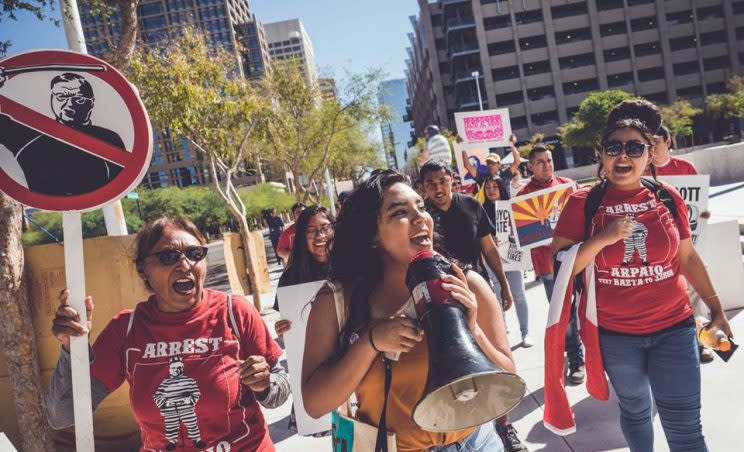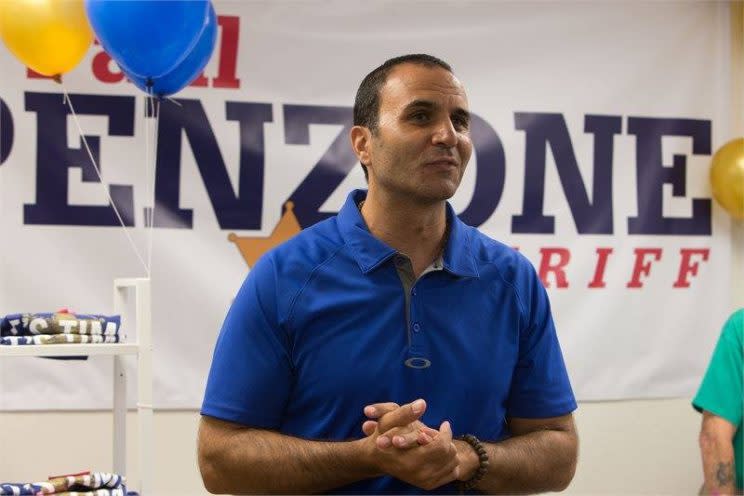Undocumented immigrants campaign against Arizona’s Sheriff Joe Arpaio

Berta Rita, born in Mexico, was 19 years old when she entered the United States without papers and settled in Phoenix. That was in 1992 — one year before Joe Arpaio was elected to his first term as sheriff of Maricopa County.
Twenty-four years later, Rita has lived in the U.S. longer than she did in Mexico, and for most of her time in the country, she has lived in fear of Arpaio, who built his reputation as the country’s most anti-immigrant sheriff with controversial policing tactics that included workplace immigration raids and traffic stops targeted at Latino drivers.
“Because of this we are always living in fear,” Rita, who does not speak English, told Yahoo News in Spanish. “Fear of walking down the street, of going to the school for our children.”
Her biggest fear is that one day she or her husband will be caught in a raid or a sweep and deported. “I’m not going to return to the house, and the kids are waiting,” she said, imagining that day.
Four of her five children were born in the U.S., and the fifth, “gracias a Dios,” married an American woman.
Now, as Arpaio runs for a seventh term, Rita is one of several undocumented immigrants working with the Bazta Arpaio campaign to put an end to the long-running reign of Arpaio, who bills himself as “America’s Toughest Sheriff.”

Whereas other community-based groups, such as One Arizona, have been focused on registering Latino voters, Bazta Arpaio’s mission is to get registered voters to the polls.
“We canvass neighborhoods and talk to [people] about Arpaio and all the ways he has impacted our community negatively,” Ernesto Lopez, a field director for Bazta (a play on “Enough” in Spanish) Arpaio, told Yahoo News.
For the past few weeks, Bazta has been focused on assisting early voters with every step of the process, from answering questions about how to fill out ballots and making sure they get dropped into the mailbox to sending reminders to those who pledge to send their ballots themselves.
“We try to reduce all barriers to voting,” Lopez said, adding that next week Bazta will shift its focus to getting voters to the polls on Election Day.
“At the doors we remind people that Arpaio is on his way out and their vote will make a difference,” Lopez said.
The goal is not necessarily to change anyone’s opinion but to rally those who might already be inclined to oppose Arpaio but either chose not to vote in 2012 or have only become eligible to do so in the four years since then.
Lopez said that “90 percent of the people we talk to dislike Arpaio,” so Bazta’s job is to motivate those people to translate that sentiment into votes.
Though 18-to-22-year-olds make up a majority of the first-time voters on Bazta Arpaio’s radar, Lopez noted that the group also includes people over the age of 45 who’ve recently become U.S. citizens. Of the 100,000-plus voters the campaign seeks to mobilize in Arizona’s most populous county — with more than 4 million people — more than 90 percent are Latino.
Between 2012 and 2016, the number of eligible Latino voters in the U.S. has grown by 4 million to an estimated 27.3 million nationwide, according to the Pew Research Center, which also found that 80 percent of that growth was driven by American-born millennials who’ve turned 18 since the last election.
According to Census figures, as of 2014 close to 22 percent of all eligible voters in Arizona were Hispanic, 43.3 percent of them ages 18 to 33.
Pew notes that, based on U.S. Census data, Latino voters have largely supported Democratic candidates for president. Yet, despite their growing numbers, the potential for Hispanic voters to wield major political influence on both the national and local level has been hampered by low voter turnout among this population. In 2012, for example, only 48 percent of eligible Latino voters showed up to the polls on Election Day, far below turnout rates for whites and African-Americans. But recent surveys by the political opinion research firm Latino Decisions found that 71 percent of Latinos believe it will be more important to vote in the 2016 election than it was in 2012.
Arpaio faces a host of problems in his reelection campaign.
Last month, the U.S. Justice Department announced that it would charge Arpaio with criminal contempt of court for defying a federal judge’s order to stop racially profiling Latinos for traffic stops and other discriminatory policing tactics.
The same day, The Arizona Republic’s traditionally conservative editorial board declared its support for Arpaio’s Democratic challenger, Paul Penzone.
“Arpaio’s cactus-kicking version of a good old boy lawman included institutionalizing a system of racial profiling against Latinos, who make up nearly one-third of Maricopa County,” read the Republic’s endorsement. “Maricopa County is home to about 4 million people. Sheriff Joe Arpaio does a good job of serving one of them: himself.”
About Penzone, a 21-year veteran of the Phoenix police department, the paper wrote that he “wants to refocus the Maricopa County Sheriff’s Office on modern law enforcement and community partnerships to make neighborhoods safer.”
“In other words,” it continued, “he wants to do the job. That would be a refreshing change.”
An Arizona Republic/Morrison/Cronkite News poll conducted following news of the Justice Department’s plan to file charges showed Penzone leading by almost 15 points. The Republic noted that Arpaio’s campaign disputed the poll, citing its own survey that found the incumbent Republican ahead by nearly eight points.
Penzone also challenged Arpaio in 2012, calling the sheriff’s workplace raids “ridiculous” and accusing Arpaio of “exploiting the issue of undocumented immigration” to gain media attention for himself instead of promoting public safety. Arpaio won that race by just six points — his narrowest victory ever.
Next week, Penzone hopes to close that gap for good.

“Unlike most [movies] where the sequel is not as good as the first one, I think this sequel is an extension of the first,” Penzone told Yahoo News this week, arguing that his second campaign has built on the momentum of 2012, while “the sheriff, conversely, has continued to deteriorate in terms of how he does his job.”
A spokesperson for Arpaio’s reelection campaign did not return requests from Yahoo News for comment.
There are, of course, some other factors at play.
In 2014, a team of political scientists from various universities around the country studied the potential political implications of Arizona’s Support Our Law Enforcement and Safe Neighborhoods Act, the controversial immigration legislation better known as SB 1070. The researchers predicted that fallout over the nation’s toughest immigration statute, combined with increased Latino voter mobilization in Arizona, would be beneficial for Democrats in 2016.
The increase in Latino voter mobilization appears to be having the expected result, said Joshua Zingher, an assistant professor of Political Science and Geography at Old Dominion University and one of the authors of the 2014 study.
However, “what we didn’t anticipate,” Zingher continued, was the impact Republican presidential candidate Donald Trump’s intensely anti-immigrant campaign would have on Latino voters nationwide.
“Trump has essentially reinforced the effect of SB 1070, especially with Arpaio being one of Trump’s supporters early on,” Zingher said.
In fact, where an endorsement from Arpaio was once considered a valuable asset for any Republican presidential hopeful seeking to appear tough on immigration, Zingher suggested that Arpaio’s alliance with Trump may actually be hurting the sheriff’s chance of reelection.
Tania Unzueta, another field coordinator for Bazta Arpaio and an undocumented immigrant, agrees.
Anti-immigrant policies like those promoted by Arpaio have long “been painted very much as an issue of safety and protecting the homeland,” she said. But with his brash and unencoded promises to “build a wall” to keep Mexico from sending “rapists” and “criminals” over the border, Unzueta suggested that Trump has, in fact, “helped [reframe] the rhetoric against immigrants as very clearly racist, rather than an issue of national security.”
“Seeing those same messages but in a much more outwardly racist way, that’s been part of the Trump effect,” she said.
Zingher is hesitant to make any predictions about the Maricopa County sheriff’s race, noting that, “I thought the [2012] election might be his last, but I’ve been wrong every time.” Still, he said, “If you look at the demographics of Maricopa County, it becomes clear that if Latinos could mobilize they’ll have the ability to get rid of him.”
Though Penzone said he respects the position of groups like Bazta Arpaio and “appreciate[s] what they’re working to accomplish,” his campaign doesn’t have “any kind of coordinated relationship” with them. “What we have is an alignment, a common objective,” he said. “Everyone wants to see responsible and principled law enforcement in this community… My path is to be the person who provides it.”
Even if he wins, Penzone said, “my concern is their justified distrust and disappointment in Sheriff Arpaio should not be transferred to me.” Instead, he said, “we should start fresh going forward.” He argued that the relationship between the Maricopa County Sheriff’s Office and the community it serves should be “not adversarial but a partnership.”
Bazta organizers like Unzueta are just as quick to clarify that the “the campaign is very much about getting Arpaio out of office” and “less about endorsing and being supportive of Penzone.”
Rather than throw their support behind a particular candidate, Unzueta explained, the idea is to “build up the power of the community so whoever wins that seat will have to be accountable to them.”
She pointed to the #ByeAnita campaign, a successful grassroots effort to unseat Cook County State’s Attorney Anita Alvarez in Illinois over her handling of the fatal police shooting of African-American teenager Laquan McDonald.
A longtime Chicago resident and activist, Unzueta was involved in the #ByeAnita campaign before she temporarily relocated to Phoenix to help with Bazta Arpaio — a much more personal endeavor. Since moving to the U.S. from Mexico at age 10, Unzueta has spent most of her life burdened by the “fear of deportation” and other potential consequences that she, as well as both her parents, face by being undocumented.
It only felt right, then, to be a part of this fight to “defeat Arpaio, this very anti-immigrant man who has made a career or criminalizing immigrants.” Last month, Unzueta’s mother put aside her own fears and joined her daughter in Maricopa County for a day of door knocking and campaigning against Arpaio.
“There is this fear that exists,” Unzueta said. “But the most inspiring thing is that those people who are supposed to be scared are organizing to get Arpaio out of office, like my mom.”
Or, like Berta Rita.
With less than a week left until the election, Rita said she’s feeling anxious yet positive. “If we are not to win, we will continue with the fight against Arpaio,” she said, declaring that ultimately the point of the Bazta Arpaio campaign is “to show politicians that we will not accept racism anymore, here or anywhere else.”
And that, Rita said, is worth the risk of deportation.
“We’re not going to give up,” she said. “And we’re not going to live in fear.”



